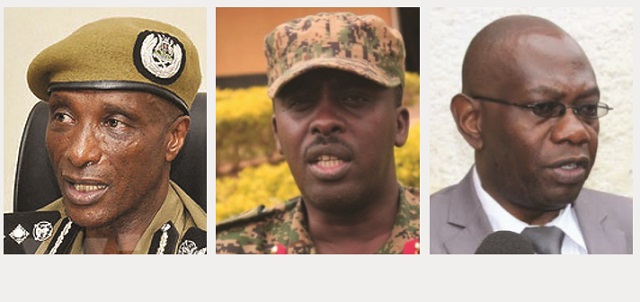
“Court had said it was in the interest of government that these suspects are examined as this would either absolve them or show that indeed as they suspects allege they were tortured,” Rwakafuzi said, “but now the prison authorities have blocked the process. We have informed court that its order was defied.”
However, Frank Baine, the Uganda Prisons Spokesperson denied that the authorities defied the said court order.
“When they first came they had a court order for 19 suspects with a list of the said 19 and they were allowed to examine them,” Baine told The Independent on Sept.11, “Then later they returned and said let us examine these other three. That is where the problem was because you cannot examine these others without another court order.”
He added, however, that the matter had now been resolved. “The OC says he has received the new order and they are now free to come and examine the others.”
As we interviewed Rwakafuzi, around the same time, police had just released Byamukama, who elements in police inflicted what is possibly the worst form of torture that nearly claimed his life before he was rushed to Nakasero hospital. Rwakafuzi was equally disturbed that police had not come out to confess, apologise, and tell the public they were wrong about Byamukama.
“This kind of impunity by the authorities subverts justice,” Rwakafuzi told The Independent, “It is absurd that those who are supposed to ensure justice are the ones subverting it.”
To make the case of the impact of torture on these victims, Rwakafuzi said, Byamukama’s physical wounds might have healed but the psychological pain lingers on—the reason it is very critical to examine victims like him.
The public only became aware of the scale of the torture by the army and police when Rwakafuzi carried out an investigation and exposed the torture meted out on the other suspects—13 of them. Images of the torture soon popped up on social media. The number of victims has since jumped to 21.
The suspects told Rwakafuzi that the torture was still on-going at the Chieftance of Military Intelligence (CMI), at Kireka and Nalufenya.
At Kireka, the investigation revealed that one Ddamulira Swaleh Kimuli has broken legs, Uthman Mugoya and Bawooli Mugoya, are also being tortured.
At Nalufenya, it added, Sulaiman Mudeya, Hussein Kigumba and Kaliiri Yahaya are also being tortured.
“There are many, many people being tortured,” one report reads in part, “It is possible some could be maimed totally or even dead.”
The report sparked public outrage, forced the Uganda Human Rights Commission (UHRC) to summon and question the heads of the army and police, and parliament to launch an investigation. President Yoweri Museveni was sucked in too. In a letter to CDF Gen. David Muhoozi and police chief, Gen. Kale Kayihura, Museveni warned against the use of torture to extract confessions from suspects.
But while Rwakafuzi’s investigation exerted some pressure on the security forces, Rwakafuzi continues to be frustrated by the same forces and is growing more pessimistic about their willingness to allow the victims get justice.
Despite Rwakafuzi’s assertion that Byamukama was released without being charged and should therefore be deemed innocent, the police say that is not the case.
But when pressed regarding what charges Byamukama faces, Police Spokesperson, Asan Kasingye, refused to elaborate.
“I don’t want to pre-empt the law, we shall determine that when the DPP (Director of Public Prosecutions) makes public his charges,” he said.
It is a stock response which often means Kasingye is bluffing given that previously he publicly linked the mayor’s arrest to the murder of Kaweesi. Police even apprehended some of its officers for torturing him.
“They knew he was innocent,” Rwakafuzi said, “they have released him but they won’t apologise to him and the public. The authorities need to account for such illegal, inexcusable and glaring attacks on people’s rights.”
“You said he is a murderer,” Rwakafuzi said, “how then do you just release him? What happens to his integrity? How should his community see him?”
When contacted, Jane Kajuga, the Spokesperson of the DPP told The Independent that when police initially submitted the file for the suspects in the Kaweesi murder, Byamukama’s name was not on it. Then two weeks ago police submitted the file again with evidence linking Byamukama to the murder.
“But upon review of the file,” she added, “we found that the evidence was not sufficient to charge him and we advised police accordingly.”
Asked whether that meant that Byamukama was a free man, Kajuga said: “Yes, because there is no evidence to charge him. Unless, the file returns with sufficient evidence.”
 The Independent Uganda: You get the Truth we Pay the Price
The Independent Uganda: You get the Truth we Pay the Price


